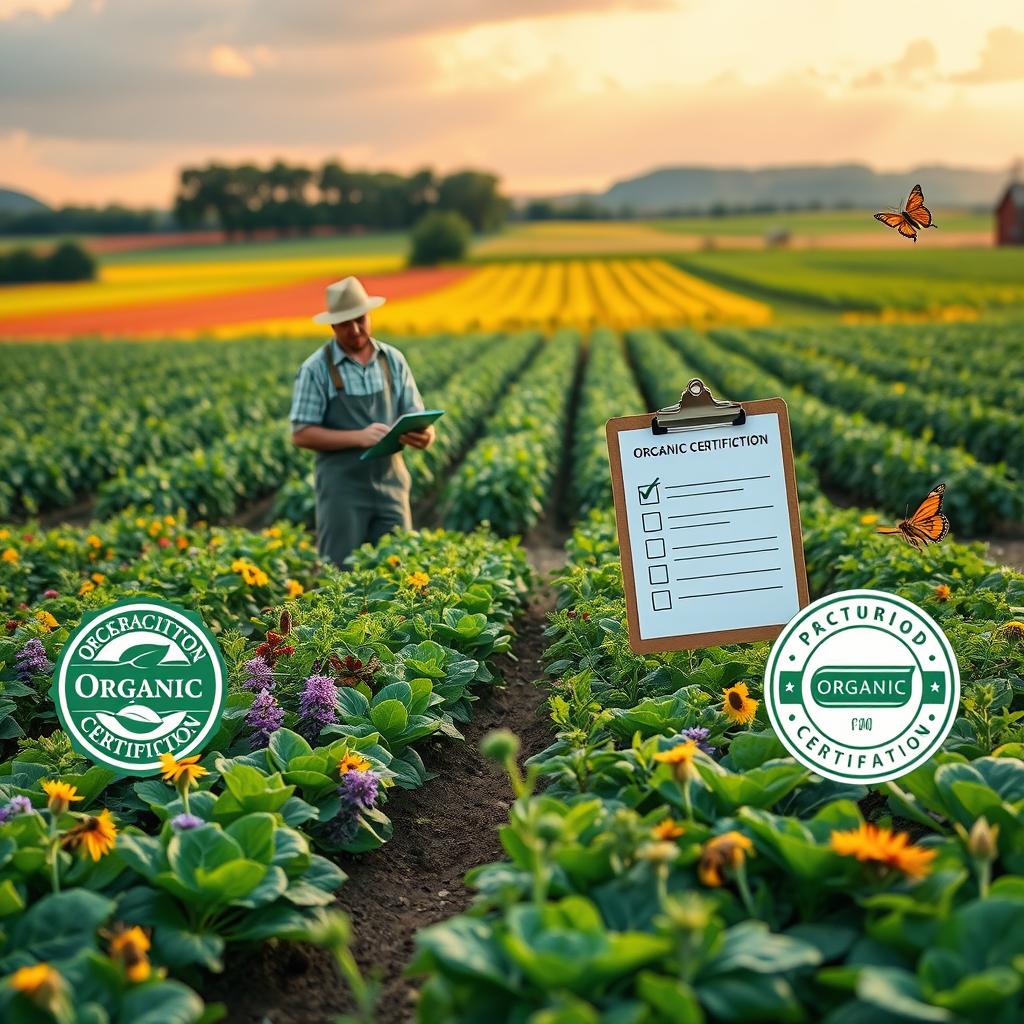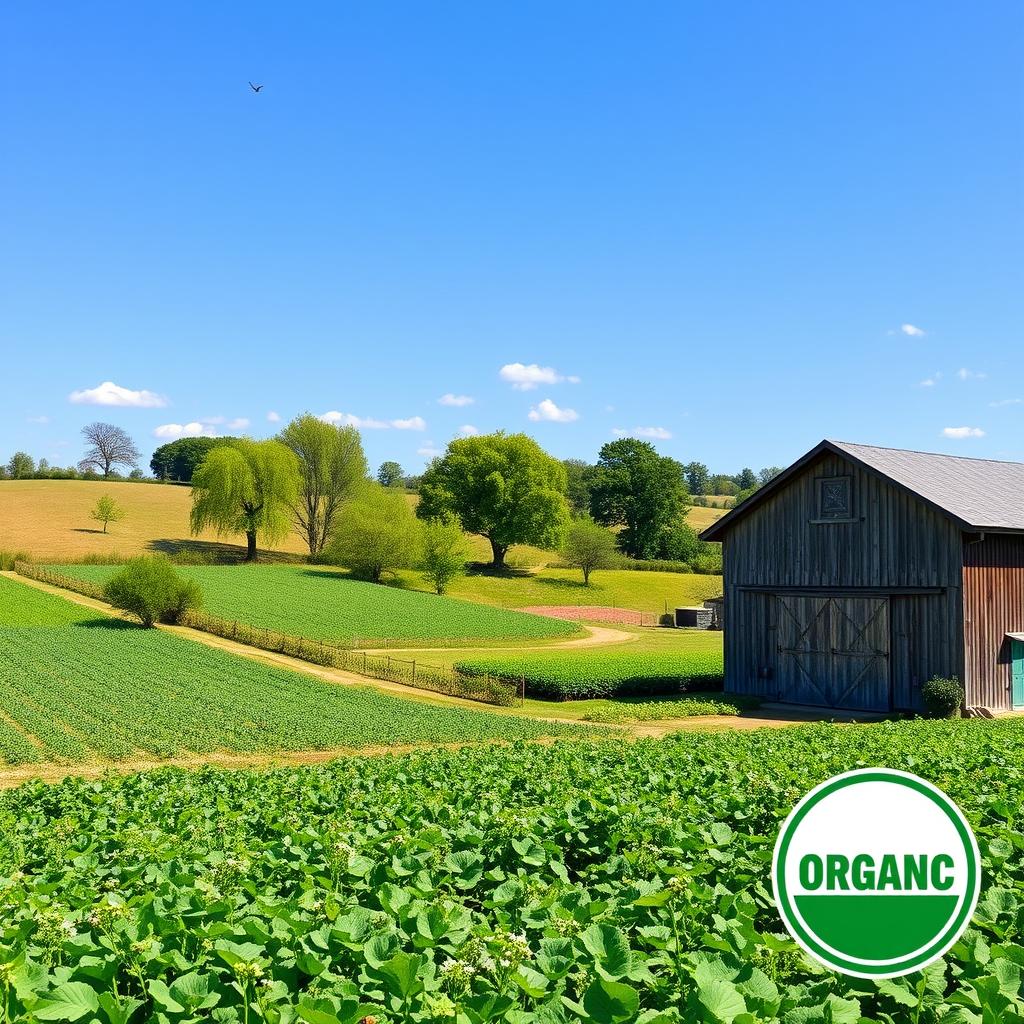What makes a product organic, and why is organic certification key in the food world? The organic certification process is strict. It ensures products are made organically. As more people seek sustainable and healthy food, organic demand grows. Businesses that want to offer organic products must follow the organic certification process. The idea of organic certification is complex. But, what are the perks of getting certified, and how do businesses meet these standards? We’ll dive into organic certification and its role in the food industry.
Click to buy citric acid from Silvairgroup
Key Takeaways:
- Organic certification is a process that ensures products meet certain standards for organic production
- The organic certification process is rigorous and essential for businesses that want to label their products as organic
- Understanding the organic certification process is crucial for businesses that want to capitalize on the growing demand for organic products
- Organic certification is not just limited to food products, but also applies to other organic agricultural products
- The benefits of becoming organically certified include increased market advantages and premium pricing opportunities
- The organic certification process involves ongoing maintenance costs and annual inspections to ensure compliance with organic standards
What Is Organic Certification?
Organic certification is a process for organic food and products. It ensures products are grown and handled in an eco-friendly way. The cost of certification varies based on the type and size of the operation. There are different types of organic certification, like for crops, livestock, and handling. Each has its own rules. Organic certification agencies, like the USDA, help make sure producers follow these standards.
Benefits of organic certification include:
- More market access
- Higher prices
- Better for the environment
Click to buy Citric Acid Anhydrous from Silvairgroup
To get certified, producers must pass a detailed inspection. They must use organic seeds, avoid synthetic chemicals, and practice conservation. The cost is high, but it can lead to more profits and a market edge. Organic certification helps producers stand out. It attracts consumers who are willing to pay more for organic. By following the organic certification requirements and working with trusted organic certification agencies, producers can ensure their products are of the highest quality and sustainable.
| Certification Type | Requirements | Benefits |
|---|---|---|
| Crop Production | Organic seeds, no synthetic pesticides or fertilizers | Increased market access, premium pricing |
| Livestock Production | Organic feed, no antibiotics or hormones | Improved animal welfare, increased profits |
| Handling | Separation from non-organic products, proper labeling | Increased efficiency, reduced contamination risk |

The Evolution of Organic Standards
Organic certification has seen big changes over time. New standards and rules have been added to keep organic products true to their promise. The organic certification process is a series of steps for farmers, producers, and handlers to get certified. Knowing how to get organic certification is key for businesses looking to join the organic market.
Click to buy liquid Citric Acid from Silvairgroup
The evolution of organic standards has been influenced by technology, changing consumer needs, and stricter rules. As the organic market expands, keeping up with new organic certification rules is vital. This includes knowing about different certifications like USDA Organic and EU Organic, and what each requires.
Businesses need to understand the organic certification process and its benefits and challenges. Getting organic certification lets businesses meet the growing demand for organic products and stand out from non-organic rivals. But, the how to get organic certification journey is complex and takes a lot of time and money.

Who Needs Organic Certification?
Organic certification is key for businesses wanting to call their products organic. It offers many benefits, like standing out to customers seeking organic choices. Meeting organic standards boosts trust and loyalty from customers. Several groups need organic certification:
- Farmers and producers must follow organic standards in their farming.
- Processors and handlers must keep organic products safe from contamination.
- Retailers and restaurants must sell or serve only organic products.
Click to buy frozen a grade beluga fish from Silverigroup
Getting certified organic helps these businesses gain more trust and loyalty. It also opens doors to new markets and customers. In summary, organic certification is vital for businesses aiming to label their products as organic. It ensures their products meet high standards, boosting customer trust and loyalty.
Understanding the Organic Certification Process
The organic certification process has several steps for businesses to follow. First, they must apply to a certified agency. They need to share details about their operations and practices. This is key in how to get organic certification, as it lets the agency check if they qualify. Some important steps in the organic certification process are:
- Application submission and review
- On-site inspection by a certified agent
- Certification decision and issuance of certificate
Businesses can make it through the organic certification process by teaming up with a certified agency. They just need to follow the steps mentioned above. Knowing how to get organic certification helps businesses have a smooth and successful journey. By following these steps and working with a certified agency, businesses can get organic certification. This opens up many benefits for them.

Essential Requirements for Certification
Organic certification means businesses must follow certain rules. They need to use land and production methods in a specific way. They also have to keep detailed records. This is all set by trusted organic certification agencies. To get organic certification, companies have to do a few things. First, they need to prepare their land for organic farming. This means removing any non-organic stuff and starting organic practices.
They also have to use organic methods for growing and managing pests. This includes using natural fertilizers and pest control. Keeping accurate records of these methods is also important. This includes crop rotation, soil tests, and pest management.
Key Components of Organic Certification
- Land requirements: Businesses must ensure that their land is free from non-organic substances and is managed using organic farming practices.
- Production methods: Companies must adopt production methods that meet the organic certification requirements, such as using natural fertilizers and pest control methods.
- Record keeping: Businesses must maintain accurate and detailed records of their production methods, including crop rotation, soil testing, and pest management.
By following these key steps, businesses can make sure their products are organic. This is good for the environment and for consumers. It also helps businesses stand out in the market.
Organic Textile Certification
Organic textile certification is a special organic certification for textile products. It means the textiles are made without harmful chemicals, pesticides, or synthetic fertilizers. The usda organic certification is well-known and respected in the field.
Benefits of organic textile certification include:
- Environmental sustainability
- Improved public health
- Increased market value
Companies that make textiles can gain from organic certification. It helps them stand out in the market. The usda organic certification is a sign of high quality and can boost a brand’s reputation.
To get organic certification, textile makers must follow strict rules. They need to use organic materials and follow sustainable methods. They also have to keep detailed records. The certification involves checking the production facility and reviewing the company’s practices. Choosing usda organic certification shows a company’s dedication to the environment and society. This can make customers more loyal and keep them coming back. As more people want organic products, organic certification is key in the textile world.
| Benefits of Organic Textile Certification | Description |
|---|---|
| Environmental Sustainability | Reduced use of toxic chemicals and pesticides |
| Improved Public Health | Reduced exposure to harmful chemicals |
| Increased Market Value | Premium pricing for organic products |

The Cost of Getting Certified
Getting organic certification can cost a lot for businesses. The organic certification cost changes based on the business size and type. The first fees, which can be hundreds or thousands of dollars, are just the start. Then, there are ongoing costs like annual checks and keeping records.
Even with these costs, many see the benefits of organic certification. These include better market access and higher prices. Organic certification agencies can help with the process and costs. Some offer financial help or payment plans to ease the organic certification cost. Here are some tips to lower certification costs:
- Look around and compare prices from different organic certification agencies
- Use financial help programs or grants
- Make record-keeping and inspections more efficient to cut down on ongoing costs
By knowing the costs and looking for ways to save, businesses can make smart choices about organic certification. This way, they can enjoy the benefits of this important label.
| Cost Component | Estimated Cost |
|---|---|
| Initial Certification Fees | $500-$5,000 |
| Ongoing Maintenance Costs | $500-$2,000 per year |
| Financial Assistance | Varies by agency and program |
Maintaining Your Organic Certification
To keep your organic certification, you must follow certain rules. The organic certification process includes regular checks to make sure you’re following the rules. To get organic certification, you need to show you care about the environment and are open about how you work.
Some important things to do to keep your certification include:
- Annual inspections to check if you’re following the rules
- Keeping good records of how you make and handle your products
- Following strict rules for how you use land and make your products
By sticking to these rules and understanding the organic certification process, you can keep your certification. This lets you sell your products for more money and reach high-end markets. If you want to get organic certification, knowing what’s needed is key. Keeping your organic certification is vital for businesses aiming to lead in the organic market. By focusing on being open, green, and following the rules, you can gain your customers’ trust. This can lead to many benefits in the organic market.
| Aspect of Maintenance | Importance |
|---|---|
| Annual Inspections | High |
| Documentation Practices | Medium |
| Compliance with Certification Standards | High |
Common Challenges and Solutions
Businesses may find it tough to understand organic certification standards and meet the requirements. Getting help from certification agencies and experts is key. They offer insights and keep businesses informed about the latest in the field. This ensures they get the most from organic certification. Some common challenges businesses face include:
- Understanding complex regulations and standards
- Meeting land use and production method requirements
- Keeping accurate records and documentation
By staying informed and seeking guidance, businesses can overcome these hurdles. They can then achieve organic certification. This brings many benefits and ensures they follow organic certification standards.
Businesses also gain from the help of organizations focused on organic certification. They make navigating the process easier. This ensures compliance with organic certification standards and helps businesses enjoy the benefits of organic certification.
| Challenge | Solution |
|---|---|
| Complex regulations | Seek guidance from certification agencies |
| Meeting requirements | Stay up-to-date with industry developments |
| Record keeping | Maintain accurate documentation |
Benefits of Becoming Organically Certified
Getting organic certification can really help businesses. It can make them more popular and better for the planet. Organic products are in high demand, and customers are willing to pay more for them.
Organic standards mean products are of the highest quality and good for the environment. This makes customers stick with you and boosts your brand’s image.
Market Advantages
Organic certification brings many market benefits. These include:
- Increased market share and competitiveness
- Improved brand reputation and customer loyalty
- Access to premium pricing opportunities
Premium Pricing Opportunities
Organic products often get a higher price tag. This can lead to more money coming in for your business. It’s a chance to make more profit by selling organic goods.
Environmental Impact
Organic certification is also good for the planet. It supports farming and production that’s kinder to the earth. By going organic, your business can help make the food system more sustainable.

International Organic Certification Standards
Organic certification standards vary worldwide. It’s key for businesses to know these standards, especially if they plan to export. The usda organic certification is well-known globally, but other countries have their own rules. Some main differences in these standards include:
- Allowed ingredients and production methods
- Labeling and packaging rules
- How inspections and certifications are done
For those exporting organic goods, knowing the target country’s standards is crucial. This knowledge ensures a smooth export journey. By following international organic certification rules, businesses can reach more customers worldwide. The usda organic certification is valuable, but knowing each country’s specific needs is vital.
| Country | Certification Standard |
|---|---|
| United States | USDA Organic |
| European Union | EU Organic |
| Canada | Canada Organic |
Conclusion
Organic certification is a big step for businesses wanting to meet the demand for green products. It offers many benefits, like higher prices and less harm to the environment. This process helps businesses grow and protect our planet. Following the steps in this article, businesses can confidently get certified. They’ll learn about land rules, production standards, and keeping records. It might seem hard, but the benefits are huge. If you’re in farming, production, processing, or retail, now is the time to start. Organic certification makes your brand stand out and helps our planet. Start this journey and see your business thrive with organic certification.
FAQ: Organic Certification
What is organic certification?
Organic certification makes sure products follow organic standards. It’s key for businesses to call their products organic.
What are the different types of organic certification?
There are many organic certifications. In the U.S., USDA organic is the most famous. Other types include private and international standards.
Who needs organic certification?
Farmers, producers, and others need it to label products as organic. It helps them stand out and attract organic buyers.
What are the essential requirements for organic certification?
To get certified, you must follow land use, production, and record-keeping standards. You must show you use organic methods and materials.
How much does it cost to get certified as organic?
The cost varies. It includes initial and ongoing fees. Sometimes, there’s help to cover these costs.
How do I maintain my organic certification?
To keep it, follow standards, pass annual checks, and keep detailed records. Not following these can lead to losing your certification.
What are the benefits of becoming organically certified?
Benefits include market advantages and premium prices. It also reduces environmental impact. Organic certification attracts organic buyers.

